

We come together as Americans when confronting common disasters and common threats, such as occurred in Boston, but we continue to split apart economically.
Anyone who wants to understand the dis-uniting of America needs to see how dramatically we’re segregating geographically by income and wealth. Today I’m giving a Town Hall talk in Fresno, in the center of California’s Central Valley, where the official unemployment rate is 15.4 percent and median family earns under $40,000. The so-called “recovery” is barely in evidence.
As the crow flies Fresno is not that far from California’s high-tech enclaves of Google, Intel, Facebook, and Apple, or from the entertainment capital of Hollywood, but they might as well be different worlds.
Being wealthy in modern America means you don’t come across anyone who isn’t, and being poor and lower-middle class means you’re surrounded by others who are just as hard up. Upward mobility — the old notion that anyone can make it with enough guts and gumption — is less of a reality.


We all know that sequestration and the automatic $85 billion in federal cuts “across the board” for discretionary spending jeopardize our very delicate recovery from the Great Recession. Though slow, fragile and incremental, the recovery is real, thanks in part to an unsung legislative action — that now is in danger of being undermined by congressional inaction.
In 1998, Congress passed the Workforce Investment Act (WIA), which greatly improved unemployed people’s lives. The WIA focused on providing employment and training services for youth and adults, preparing them for jobs in industries using a model that encouraged self-sufficiency and widespread access to resource centers and training. The goal was to help people learn the skills for life-long career advancement.
What made WIA special was that that it proactively engaged with business, education and labor (as the drivers of local economies) to guide the direction of workforce development programs in a way that would specifically address geographical needs.
» Read more about: It’s Time to Reinvest in Workforce Development »


(Art Sweatman is a City of Los Angeles tree surgeon. His post is a response to Los Angeles Times columnist Steve Lopez’s April 24 article, “Time for public employee unions to pick up the tab.” The post first appeared on SEIU Local 721’s site and is republished here with permission.)
Dear Steve:
I sat down with you a couple of years ago and discussed the impact that “givebacks” would have on our SEIU 721 members who work for the City of Los Angeles.
You seemed to care then, and city workers eventually agreed to help L.A. save money. One year later we also agreed to contribute more towards our pension benefits, so we could keep our spouses on our benefits after we retire.
Your commentary is short-sighted. You acknowledge but ignore the fact that the politicians keep lying about the city’s deficit.
» Read more about: Union Worker to Steve Lopez: We’ve Picked Up the Tab! »


Two local Thursday events will mark preparations for the annual Workers’ Memorial Day that will be observed nationally on Sunday. Today’s morning activities center on the unveiling of a work-in-progress mural depicting the contributions of immigrant workers and the release of the annual “Dying at Work in California” report. The survey tallies the cost of job-related deaths, injuries and illnesses and tells the stories of the 196 Los Angeles workers killed on the job last year. These stories include:
» Read more about: Workers’ Memorial Day: Not One More Death or Injury! »
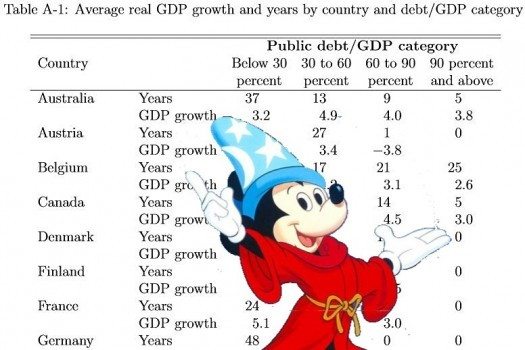
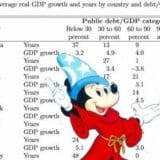
Most of us accept that the earth goes around the sun. This is impressive, since we can look up in the sky and see the sun going around the earth. We believe the opposite because we have been told about the research of astronomers over the centuries showing that what we can see with our own two eyes is wrong. Instead, we accept that the motion of the stars and planets can be much better explained by the earth going around the sun.
Suppose for a moment that astronomers and people who write on astronomy did not agree on earth or solar orbits. Imagine that a substantial group of these people, including many of the most prominent astronomers, insisted that the sun goes around the earth, as anyone can plainly see. In that case, there would likely be huge numbers of people who refused to accept that the earth goes around the sun.
» Read more about: Mickey Mouse Economics: Austerity Bible Debunked »
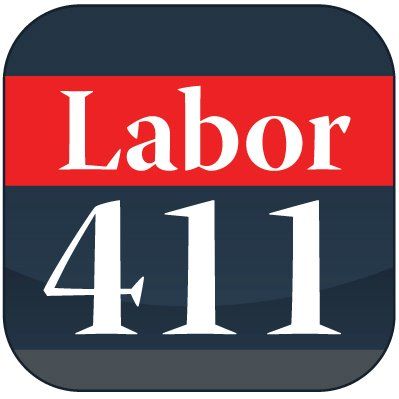

Cherri Senders wasn’t always looking for the union label. Back in the late 1980s the Washington, D.C. native was writing for the L.A. Weekly, an alternative newspaper that was generous with editorial pleas for social justice but miserly when paying its own workers.
“I saw how exploited writers were,” Senders tells Frying Pan News. “We joined the National Writers Union and were able to go from five cents a word to seven. That’s how I found out about the labor movement.”
About 15 years later a friend of Senders, who by then had started her own communications company, wanted to learn how to purchase union-made baby products, but couldn’t find a way to track down which ones bore a union label.
There had always been Buy Union lists – often out of date and pinned to the bulletin boards of union halls or, more recently,
» Read more about: Looking for the Union Label in All the Right Places »
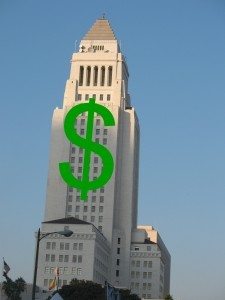

For five years a chorus of voices has been predicting bankruptcy for Los Angeles, while often calling for deeper cuts to city employee pensions. Today, however, Mayor Antonio Villaraigosa proposed a budget for Fiscal Year 2013-2014 that includes a one-time surplus of $119 million. While some of that surplus would rely on additional pay and benefit reductions for city workers, even without such cuts the city would have a projected surplus of close to $100 million.
“It’s better than seeing the light at the end of the tunnel – we’re almost out of the tunnel!” Matt Szabo, Mayor Villaraigosa’s deputy chief of staff, told Frying Pan News in an interview last week. Szabo discussed the city’s financial picture and said that dire financial warnings have been largely overblown.
“One of the issues that’s highly irritating is the ease with which some people have thrown around the bankruptcy term,” Szabo said.
» Read more about: Budget Shocker: L.A. Shows $119 Million Surplus »


After several years of swimming in red ink, the city of Los Angeles is now projecting a $119 million surplus for Fiscal Year 2013-2014, according to city documents presented at a news conference today presided over by Mayor Antonio Villaraigosa. (See Page 3 of the mayor’s Budget Presentation.)
City Administrative Officer Miguel Santana and other officials also attended the media event at City Hall.
The surplus is dependent on the city receiving certain one-time revenues, much of them due from the state and federal governments.
Nevertheless, this disclosure dramatically rebuffs a steady stream of predictions, made by an array of officials, mayoral candidates and commentators, that L.A. faces the possibility of bankruptcy. Such predictions have invariably been accompanied by calls to reduce the pension benefits of city employees.
Later this morning Frying Pan News will post investigative reporter Gary Cohn’s analysis of what has produced the surplus – and of the motivations behind predictions of the city’s insolvency.
» Read more about: Bulletin: New L.A. Budget Shows $119 Million Surplus »


Weeks after a political stalemate set in motion $85 billion in federal spending cuts for fiscal year 2013, sequestration has shifted from a political debate in the halls of Congress to a looming reality in neighborhood streets – especially in some of the poorest areas of the country.
In Georgia, the drop in federal dollars is taking an 11 percent bite out of extended unemployment benefits that more than 61,000 Georgians depend on for food, utilities and housing, according to the Rome News-Tribune.
In Mississippi, 2,300 children under the age of three will likely lose the care and early education they receive in federally-supported Early Head Start programs.
And in Texas’s Rio Grande Valley, sequester will mean cuts in legal aid services and housing vouchers for low-income families and reductions in job-search services for the unemployed.
Many community organizations that serve low-income families are already feeling the money pinch.
» Read more about: Sequester Taking a Toll on America’s Needy »


The reason President Obama’s proposal to cut Social Security benefits is tragic is that it is simply not necessary. His plan is to use a different method to compute how much benefits are raised to offset inflation. But Social Security will add very little to federal spending over the next 30 to 40 years. As a proportion of national income (GDP), It will rise from five percent to six percent. At the same time, retirees are set to get much less money from their pensions because so many were forced to depend on 401(k)s and defined contribution plans rather than traditional pensions with defined benefits.
But a new report from Goldman Sachs economists puts the Obama decision in an even harsher light. The federal deficit is coming down rapidly on its own. In a piece entitled, “The Rapidly Shrinking Federal Deficit,” Goldman notes that the deficit averaged 4.5 percent of GDP in the first calendar quarter,
» Read more about: The U.S. Deficit Is Down — So Why Cut Social Security? »
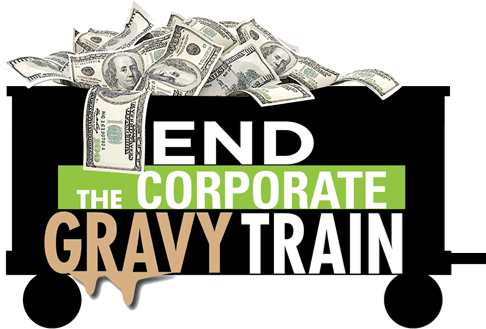
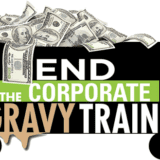
Hundreds of workers descended on the Capitol yesterday as part of the California Labor Federation’s legislative conference lobby day with a simple message for both Democrats and Republicans in office: “End the Corporate Gravy Train.” They were referring to the state’s wasteful enterprise zone program, which takes money away from schools, infrastructure and other valuable services to line the pockets of corporate CEOs at Walmart and other large, profitable corporations.
At a lunchtime rally, workers, labor leaders and elected officials railed against this massive giveaway and urged support for SB 434, a reform bill authored by State Sen. Jerry Hill. The event coincided with the launch of a new website, www.EndTheCorporateGravyTrain.com, which details the wasteful program and exposes some of the massive companies that are riding the gravy train.
California Labor Federation Executive Secretary-Treasurer Art Pulaski:
“Taxpayers are sending $700 million per year straight into the pockets of corporate executives without seeing good jobs created in return.
» Read more about: Capitol Rally: Derail This Corporate Gravy Train! »


The biggest economic debate is between Keynesians (who want more government spending and lower interest rates in order to fuel demand) and supply-side “austerics” (who want lower taxes on the wealthy and on corporations to boost incentives to hire and invest, and who see government deficits crowding out private investment).
But both approaches have problems.
George W. Bush tried supply-side tax cuts but nothing trickled down. Jobs and wages declined. And austerity economics has been a disaster for Europe.
Unfortunately the U.S. is now adopting supply-side austerics by making the Bush tax cuts permanent for 98 percent of taxpayers, hiking Social Security taxes back up, and implementing the sequester.
I’m on the Keynesian side. Yet the biggest weakness of modern Keynesian economics is it doesn’t have a clear answer for how much spending is necessary in an economy, like ours, in which wages keep dropping and government debt keeps growing.
» Read more about: America’s Worst Recovery on Record — And Why »
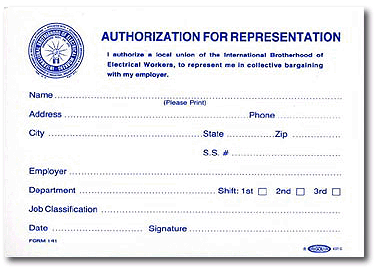

My cousin and I have stayed in touch over the years despite the distance — he grew up in a Texas border town and has lived his adult life in Phoenix. Both he and his wife have held well-paid positions in the health field. Like most families, when we visit, we avoid subjects in-laws shouldn’t talk about, including politics and religion. But this time, he brought up the topic of unions, so over the next several days we talked intermittently about unions and why low wage workers need them.
On our final evening together, we sat across from each other in one of those expensive Santa Monica restaurants named after its chef. I said, “So here is the bottom line for me: People who work all day should be able to provide shelter and food for their families, and they ought to have health care.”
“I don’t know that I disagree with that,” he replied.
» Read more about: Building a Better Life: Bottom Lines and Top Priorities »
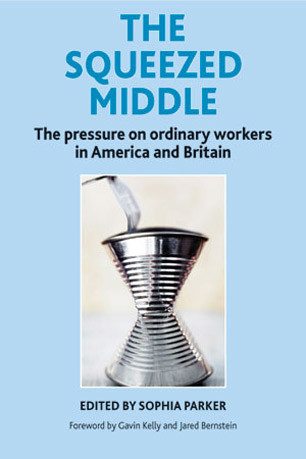
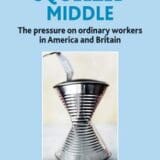
The Squeezed Middle: The Pressure on Ordinary Workers in America and Britain, a short book edited by Sophia Parker, brings together 16 scholars and activists to diagnose America’s malaise. (Policy Press, 2013.)
You probably don’t need a book to tell you that the United States has fallen into the economic abyss and the United Kingdom is teetering on the edge. Wages have been flat for 40 years; welfare as we knew it is gone and the political system has been corrupted by corporations and greed.
If you’re British, you might think that the United Kingdom isn’t teetering, but has already firmly landed at rock bottom. If that’s what you think, then think again. Things are much more savage on the Tea Party side of the Atlantic Ocean. Mother country, beware.
Inequality has risen dramatically in both the United States and the United Kingdom, but the United Kingdom maintains some vestiges of civilization,
Here’s Public Works‘ singalong video of Irving Berlin’s 1942 song, “I Paid My Taxes Today,” performed by Gene Autry. Lyrics below:
I said to my Uncle Sam
“Old Man Taxes, here I am”
And he was glad to see me.
Mister Small Fry, yes, indeed.
Lower brackets, that’s my speed.
But he was glad to see me.
I paid my income tax today.
I never felt so proud before,
To be right there with the millions more
Who paid their income tax today.
I’m squared up with the USA
See those bombers in the sky,
Rockefeller helped to build ‘em.
So did I.
I PAID MY INCOME TAX TODAY
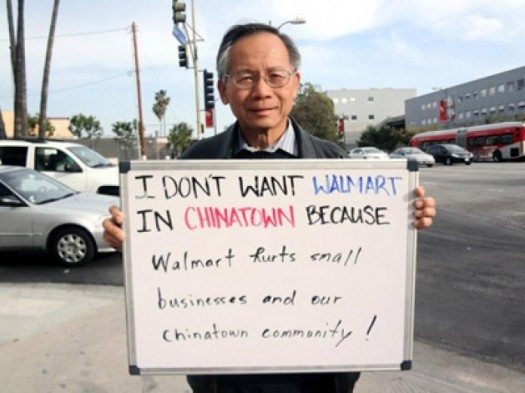

Walmart might have viewed their plans to open in an existing building in Los Angeles Chinatown as a bullet-proof strategy. The retail giant would open its new store in the Grand Plaza, an existing building, that unlike new construction, would allow the retailer to proceed without a public hearing.
As the company worked on its renovation plans, which started last year, Aiha Nguyen at the Los Angeles Alliance for a New Economy (LAANE) and community members dug through reams of city documents.
They realized the retailer and city officials needed something central to the democratic process — a public hearing for neighborhood residents to provide feedback about the store in the Grand Plaza building.
The Grand Plaza had received about $7 million in subsidies years ago, Nguyen said, adding that a hearing and environmental requirements from a city-approved Chinatown Redevelopment Plan still apply to any new tenant.
That requirement is serving as the basis for the April 4 lawsuit that could block Walmart from opening in 30,000 square feet of space in the downtown area.
» Read more about: Community Fights Walmart’s Backdoor Chinatown Strategy »


(Orlando Ayala has been a truck driver at the ports of L.A. and Long Beach for 10 years. He recently sat down and talked to LAANE Deputy Director Patricia Castellanos about the successful effort to improve conditions at Toll, the global logistics company where he works. Yesterday marked the one-year anniversary of the election in which Toll workers chose to be represented by a union – the first such election in three decades.)
I was recently accused of thinking with my heart and not with my head, of letting my passions and outrage get the best of me and guide my actions. At the time, this wasn’t a compliment. But these traits have served me well. If not for them, I may not have crossed multiple borders seeking a better life in the U.S., or been driven to action by the outrage I felt at seeing injustices suffered by the thousands of port truck drivers at the largest port in the country.
» Read more about: How Organizing for a Union Changed My Life »
The White House and prominent Democrats are talking about reducing future Social Security payments by using a formula for adjusting for inflation that’s stingier than the current one. It’s called the “Chained CPI.” I did this video so you can understand it — and understand why it’s so wrongheaded.
Even Social Security’s current inflation adjustment understates the true impact of inflation on the elderly. That’s because they spend 20 to 40 percent of their incomes on health care, and health-care costs have been rising faster than inflation. So why adopt a new inflation adjustment that’s even stingier than the current one?
Social Security benefits are already meager for most recipients. The median income of Americans over 65 is less than $20,000 a year. Nearly 70 percent of them depend on Social Security for more than half of this. The average Social Security benefit is less than $15,000 a year.
Besides,
» Read more about: Robert Reich: Don’t “Chain” Social Security »


The national discussion on immigration reform is heating up now that the “Gang of Eight” plans to release its detailed version of the Senate bill. As with similar efforts in past years to pass comprehensive immigration reform through Congress, the draft legislation to start the process will undergo massive changes as legislators debate the issue, especially as it moves into the House of Representatives. Yet one point has received considerably less attention in the national debate, but will probably make the most difference to most immigrants and the economy– the enforcement of workplace rights.
I have been involved in the debate on immigration reform now for more than 25 years, since the passage of the Immigration Reform and Control Act of 1986 (IRCA). I have seen the demographics of the country shift and have witnessed this debate in many stages and from many perspectives.
One thing we learned from the Immigration Reform Control Act (IRCA) of 1986 is that it fell dramatically short when it came to improving the working conditions of the estimated three million immigrants who gained legal status.
» Read more about: Immigration Reform Alone Won’t End Workplace Wrongs »


It was announced over the weekend the bipartisan Senate “Gang of Eight” came to an agreement in principle on a major aspect of creating a commonsense immigration process that benefits all workers.
This agreement includes a new kind of worker visa program called the W-Visa, which will work for everyone, not just employers.
Here are five things you need to know about this new employer-based visa:
» Read more about: Five Important Points of the Immigration Agreement »